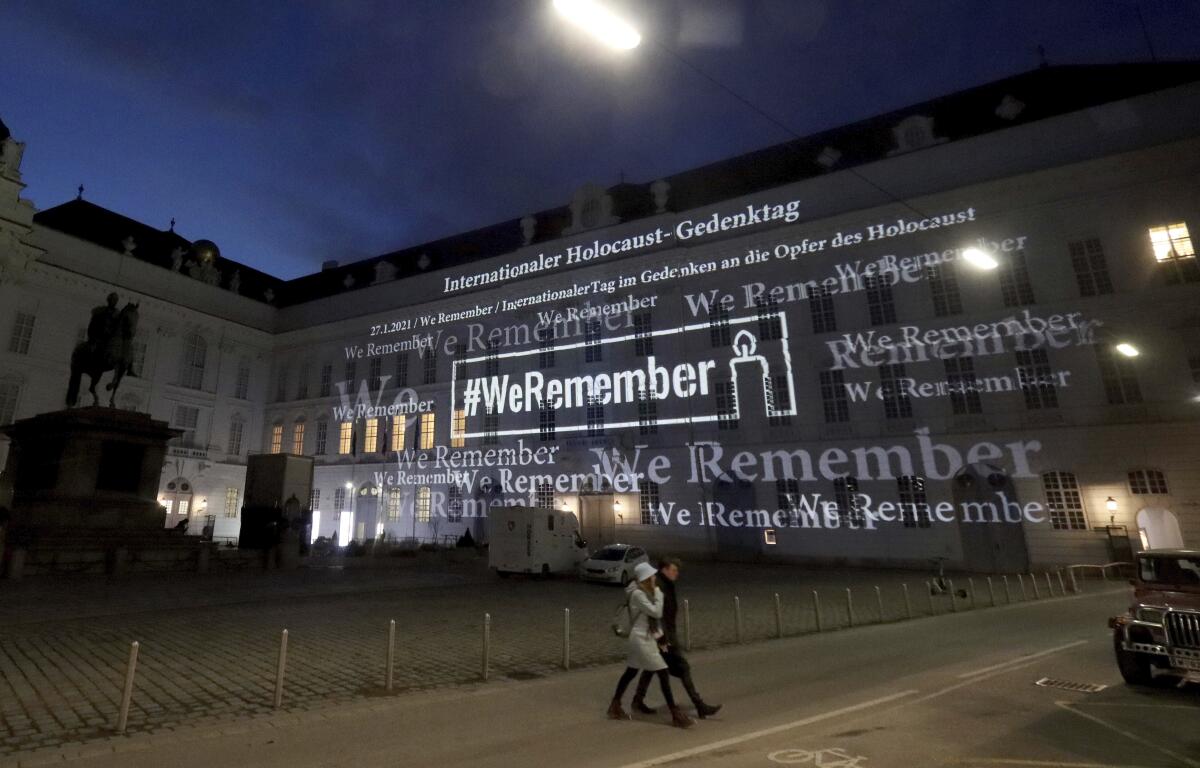Opinion: Why is it political to ask Holocaust survivors about the state of U.S. democracy?

- Share via
Good morning. I’m Paul Thornton, and it is Saturday, Jan. 29, 2022. Let’s look back at the week in Opinion.
Asking Holocaust survivors what concerns them about this country today should not be seen as an overtly political act. But since almost anything can be fairly construed as political nowadays, I should be more precise: Considering the views of Holocaust survivors should not be seen as an overtly partisan act.
Still, to many who wrote in response to last week’s newsletter summarizing our project featuring essays, videos and family photos from some of our readers who survived the Holocaust, our effort was anti-Republican, left-wing propaganda.
To be clear, most of the feedback I saw was positive. But as journalists tend to do, I fixated on the criticism, especially from those who accused us of exploiting elderly survivors for partisan ends. One of them concluded his email:
“It is just as incredible that you pandered to readers by somehow associating conservatism in the United States with the evils of Hitler’s Nazism and the horrors of the Holocaust. That is so beneath you. Do you have no shame?”
Among critical reactions, this was the most common thread: How dare we compare conservatism today to Nazi Germany and the Holocaust?
A couple of points: The comparison is to Germany before the Nazis were elected into power, and we’re not the ones making it. As I wrote in last week’s newsletter, since the dawn of the Trump presidency — and picking up especially after the Jan. 6, 2021, U.S. Capitol riot — it has been readers expressing alarm, in letters to the editor, that prompted me to ask Holocaust survivors what they think about the comparisons being made between the U.S. political situation today and what happened in Germany before the Holocaust and World War II. Two of the four survivors who responded to the query expressed serious concern about what they saw as similarities; another rejected the comparisons entirely, and the fourth wrote broadly about her worries today, which had little to do with partisan politics.
That leads me to my second point: On the whole, the responses were not exactly convenient for anyone hoping to come away with something fully accommodating their politics or affirming their fears. Marjorie Perloff, the poet and literary critic whose family escaped Austria after the Anschluss in 1938, pointed out numerous differences between the U.S. and pre-Nazi Germany and cited substandard education as a genuine threat to democracy today. Betsy Kaplan, who herself arrived in Los Angeles as a child refugee, wondered if this country today could safely take in all the migrants trying to cross our Southern border.
Does publishing those responses betray some partisan animus?
Enjoying this newsletter? Consider subscribing to the Los Angeles Times
Your support helps us deliver the news that matters most. Become a subscriber.
Here, I should disclose my thoughts on the subject: I worry tremendously about the health of representative democracy in a country riven by tribalism, where one of the major parties still stands behind a former president who tried to overthrow an election and has created an alternate political universe based on a Big Lie. The willingness of people to ignore moral standards and truth for the benefit of their leader raises bright red flags.
Another common objection to the project: Even if the U.S. is discarding certain democratic norms, any implication that a mass atrocity like the Holocaust looms is totally unhinged. My response: That misses the point, and dangerously so.
This week, especially around International Holocaust Remembrance Day on Thursday, you might have come across the solemn admonishment, “Never forget.” As Holocaust survivors age — the youngest participant in our project, Josie Levy Martin of Santa Barbara, is 83 — this need to remember, to listen to survivors who witnessed unspeakable hate and inhumanity, becomes more urgent. In her video, Martin said that during a recent talk she gave at a high school, not a single student could say they knew the name Adolf Hitler. Betsy Kaplan said it was important not only to learn about the Holocaust, but also to discuss it, “because if you don’t hear about it and you just read about, it’s almost like a fairy tale.”
With “Never forget” comes its corollary: “Never again.” And with collective knowledge of the Holocaust fading — some scary survey results from 2020 show unequivocally that we are forgetting — our ability to fulfill the latter promise weakens. This isn’t to say that we, right now, are careening toward another atrocity like the Holocaust; what it does say is that we should be more vigilant about creating the conditions in which we build up tolerance for something that, not long ago, we would have considered unthinkable.
Stay in touch.
If you’ve made it this far, you’re the kind of reader who’d benefit from subscribing to our other newsletters and to the Times.
As always, you can share your feedback by emailing me at paul.thornton@latimes.com.
A cure for the common opinion
Get thought-provoking perspectives with our weekly newsletter.
You may occasionally receive promotional content from the Los Angeles Times.




